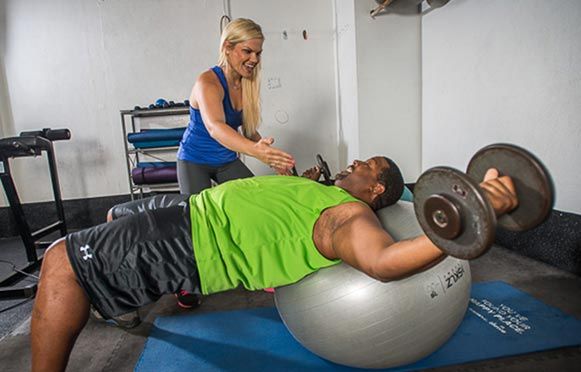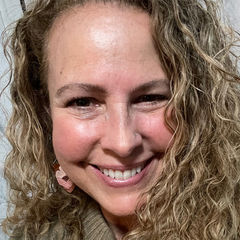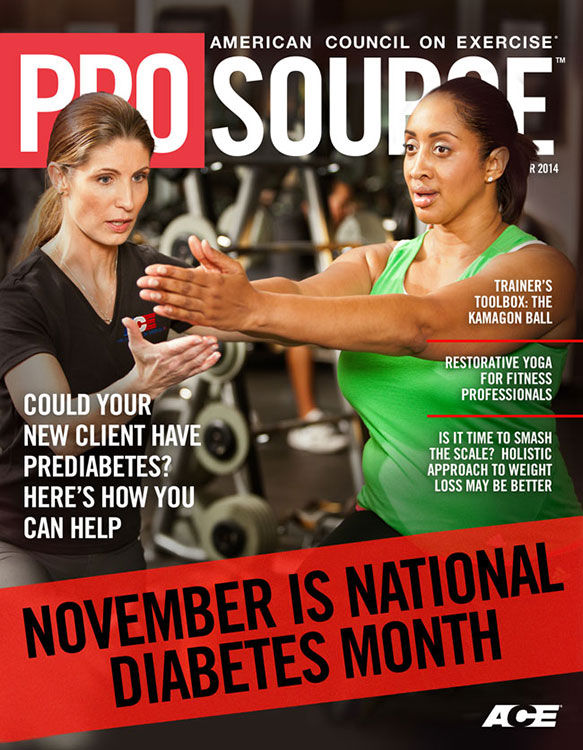
A few years ago, I interviewed several fitness pros for an article on alternative ways to assess clients’ progress. I was appalled when two male trainers told me they would never accept clients who refused to be weighed and have their body fat tested. One compared it to pre-operative testing prior to surgery. My first thought was, have we really lost all creativeness in this field that we can’t come up with other methods to evaluate progress beyond numbers? What happened to the “personal” part of training? I also asked several overweight women how they felt about body-fat testing and scale weight. Most said these things were demotivating and they didn’t need someone pinching their fat to tell them they’re fat.
Although men are not immune, women, in particular, can become obsessed over the scale, dieting and their bodies. As both a fitness professional and a recovering anorexic, I believe the path to health and having a healthy relationship with food and our bodies doesn’t have to include these often detrimental forms of assessing progress. Turns out, I’m not alone in my belief—and now there’s even research to back it up.
A New Way of Thinking
“No doubt you want to support your clients and see them progressing,” says Linda Bacon, Ph.D., author of Health at Every Size and the newly released, Body Respect. Bacon suggests helping your clients take the focus off their weight and instead concentrate on making overall healthy lifestyle changes. “You’ll be more effective if you keep your [focus] on feeling good, and about improved habits and the feelings of well-being that come from them.”
How to Help Clients Stop Focusing on Weight
“Often, when people lose a lot of weight, they can become a leader in the shift away from weight loss as a point of emphasis,” says Ross. “Many people will ask them how much weight they have lost, and answering that question directly feeds the disease of hyper-focus on weight. I encourage everyone I work with who loses a lot of weight to answer by saying, ‘I don’t know, I just feel great. I’ve been focusing on moving more, eating healthfully and feeling good. Thanks for noticing that it’s working.’”
Help clients make an emotional connection to what they want and you help them create long-term success, says Jonathan Ross, ACE Senior Consultant for Personal Training and author of Abs Revealed. “Long-term goals are very difficult to use as motivators,” he explains, “unless there is a powerful emotional connection to those goals and the client is aware of and drawn to the actions now that will lead to long-term change.”
“I know it may be hard to help clients re-focus, particularly when they are so intent on wanting weight loss,” explains Bacon. But “every time you make fat the focus, you reinforce the damages of a weight-obsessed culture, the shame about [the client’s] current body, and the bad feelings that come from repeated failure in the long run. Repeated cycles of weight loss and regain, unhealthy weight-loss behaviors, poor body image, eating disorders, stress, stigmatization and discrimination are all collateral damage in the war against fat. Every time you make fat the problem, these are the side effects, however unintended they may be. It doesn’t have to be that way.”
Not everyone fully buys into this mindset, though. “I think assessing body fat is important to have a starting point,” explains Sonya Angelone, M.S., R.D.N., C.L.T., spokesperson for the Academy of Nutrition and Dietetics. “It’s just the constant monitoring or using these numbers as a sign of success that I don’t find helpful.”
“Weight can fluctuate based on hydration, sleep levels, time of month or even time of day, so external measures are more helpful for establishing a baseline than to gauge progress,” says Michele McRae, a certified nutritionist for Rainbow Light, a vitamin and supplement company. “The ultimate goal is to feel more healthy and alive in our skin. Stamina, strength, muscle tone, energy levels and a growing sense of body confidence are the truest indicators of progress.”
Angelone believes body-fat measurements are important to prevent being “skinny fat” and can also motivate those who aren’t seeing much movement on the scale. “If clients are only focusing on the scale, they will not appreciate the major changes and health benefits they are achieving with their food and exercise program. I think occasional weighing is good in the maintenance phase because it allows the client to notice when they have gained a couple pounds and work to get them off before they ‘fall off the wagon.’”
Fostering the Mind-body Connection

Help Clients Re-Focus
To help clients take the focus off their weight, here are a few mind exercises to help them appreciate other things about their bodies:
- Ask clients to describe something they like and appreciate about their bodies. (I often give this challenge to my clients after they’ve made a self-deprecating comment!)
- Make a list of the benefits they have received so far from exercise. This one is always eye opening to clients. As their mindsets change, they begin to really become aware of the ways their lives have improved. For example, I had an 80-year-old client paint her porch by herself; she never thought she would be able to do that task again, let alone do it with ease! And a male client in his mid-60s cut branches using his chainsaw. He said he never could have done that before strength training. Help your clients see the wide-reaching benefits of being stronger and more fit.
- Poor body image is often a reflection of poor self-worth and low self-esteem. Help clients use positive affirmations to help re-write old messages about themselves and create a more positive overall self-image.
Then again, this is the type of mindset professionals like Bacon are trying to change. Should anyone really obsess over a couple of pounds? And who says those extra pounds are fat? Maybe too much sodium was consumed, a food caused inflammation within the body (for instance, if someone is sensitive to gluten or dairy), or the individual is premenstrual. This is where learning to tap into the mind-body connection comes in so people are less likely to live and die by the scale.
This also brings up another point that many of us have been taught—that it’s all about calories in, calories out. If only it were that simple.
“Unfortunately, it doesn’t work that way,” explains Bacon. “We can’t control the calorie-balance equation to the extent we’ve long believed. It’s easy in the short-term, which is why short-term weight loss typically occurs. But over the long-term, the body has compensatory mechanisms that undermine its ability to maintain weight loss. Long-term studies show that few people maintain significant weight loss or body-fat loss by simply increasing their physical activity, even when exercise habits are maintained.”
There are many reasons people have trouble losing weight and keeping it off, from genetics to environmental factors (Bacon’s book is a great resource, loaded with years of research studies on these topics). The calories in, calories out theory overly simplifies the human body and how it works. For instance, two areas that research studies suggest affect weight are sleep and stress, both of which you, as a fitness professional, can help your clients work on.
“Our bodies secrete hormones that affect appetite, metabolism and glucose levels when we sleep,” explains McRae. “This includes leptin, the hormone that triggers satiety and alerts our brain that it has had enough food. Poor sleep is also associated with increased cortisol levels and contributes to stress and inflammation.”
Chronic stress also increases cortisol levels. Lack of sleep is likely to increase stress levels (and vice versa) so you can see how this becomes a horrible cycle of sleep deprivation and stress that, in and of itself, can lead to weight gain. Plus, a person who feels exhausted is unlikely to want to exercise. And what foods do most people crave when they’re exhausted? Mostly likely carbs, largely because they are the preferred fuel for the brain—and the brain is telling the body it is exhausted and needs some quick energy.
“Holistic weight loss is losing weight by addressing the whole person, not just a good diet or exercise program like many dieters think,” says John Rowley, certified trainer and author of The Power of Positive Fitness. “Addressing the body, mind and spirit will promote a healthy, attainable lifestyle that will be much more effective long-term than a fad diet program. Keep in mind it is much more important what goes into your head than what goes into your mouth, because one controls the other!”
A Change in Mindset

Positive Language
In your work with clients, avoid categorizing food as “good” and “bad,” as many people will equate this to their self-worth. Also avoid using the term “cheating,” as in, “I cheated on my diet” or “Today is my cheat day.” The word “cheat” has NO positive connotations and should not be connected to food.
If I had my way, I’d proclaim a “Smash Your Scale Day” and no one would step foot on a scale again. But as Ross reminded me, this can often scare people away. “If we push too hard for this shift in focus with someone who is overly obsessed with the scale or weight, they may not be receptive to what we are bringing to them,” he says. “This could cause them to lose faith or trust in us right away by pulling them too far outside their comfort zone.
“If I'm working with those who are more open and receptive to a holistic approach right out of the gate, then I dive right in, but always at a pace that is right for them. Getting people started and to a place of good consistency is the main goal, so adjusting the pace and scope of your instruction will vary, based on how quickly someone can move toward that holistic approach.”
Part of this holistic approach is encouraging clients to get back in touch with their bodies. Do they even know what hunger feels like? Many don’t, as years of dieting have dulled their senses. Binge eaters have the ability to shut off feelings of satiety and fullness—at least until their binge is over.
“Successful eating must always have an intuitive approach as an endpoint,” adds Ross. “For people with a disrupted mindset or attitude about food, this can get in the way of them listening to their bodies. Fixing the food attitude is critical. As for specifics, there is a lot of bio-individuality, so some people will do well eating smaller, more frequent meals, while others find success having larger, less frequent meals. Some people achieve optimum health as a vegan, while others do better as an omnivore. There will never be a single approach that serves all humans equally well. We must move people toward a more intuitive approach and to listen to the millions of years of DNA in our bodies that tell us what we need. Our bodies are far smarter than we can ever be—if only we have the wisdom to listen.”





 by
by 




